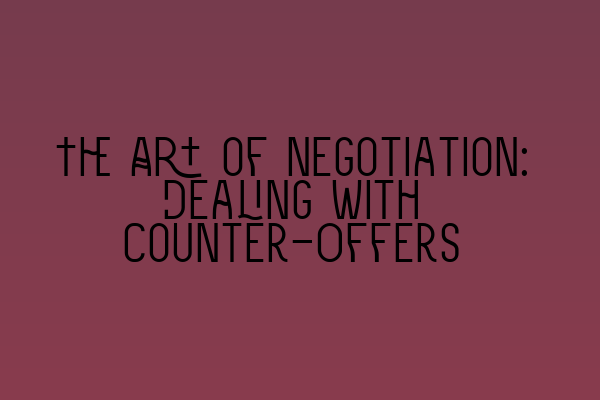Whether you’re a seasoned negotiator or new to the world of contract law, dealing with counter-offers is an essential skill to master. In the dynamic landscape of business negotiations, counter-offers can often be a turning point in the process. They can either lead to a successful agreement or create further obstacles. Therefore, understanding the art of negotiation when faced with counter-offers is crucial for achieving your desired outcomes.
What is a Counter-Offer?
A counter-offer is a response to an initial offer made during negotiations. It is a rejection of the original proposal and introduces new terms or conditions proposed by the other party involved. A counter-offer creates a back-and-forth exchange between parties, with each presenting revised terms until a mutually acceptable agreement is reached.
Importance of Strategic Thinking
Successful negotiation requires strategic thinking. Rather than immediately accepting or rejecting a counter-offer, take the time to analyze the new terms presented and understand their implications. By doing so, you can assess the strengths and weaknesses of the counter-offer and develop a counter-strategy of your own.
Strategic thinking involves considering the interests and motivations of both parties and identifying potential compromises that may satisfy both sides. It also allows you to anticipate the other party’s responses and adjust your approach accordingly. This approach can result in a more collaborative and productive negotiation process.
Communicating Effectively
Clear and effective communication plays a vital role in navigating counter-offers successfully. Here are some key tips:
1. Active Listening
Listening actively and attentively during negotiations allows you to gather information and gain insights into the other party’s concerns, priorities, and objectives. This understanding will assist you in crafting a well-thought-out counter-offer that addresses their needs while also aligning with your own goals.
2. Diplomacy
Maintaining a diplomatic and professional tone throughout the negotiation process is essential. Avoid using aggressive or confrontational language, as doing so may hinder the progress and increase tension. Instead, focus on presenting your arguments and counter-offers in a respectful and constructive manner.
3. Clarity
Ensure your counter-offer is clear and concise. Use simple and straightforward language to convey your proposed terms effectively. Ambiguity or confusion can lead to misunderstandings and further complications.
Negotiating With Confidence
Confidence is key when negotiating counter-offers. Demonstrating confidence in your positions and proposed terms can positively influence the other party’s perception of your credibility and professionalism. Here are some elements to consider:
1. Research
Thoroughly research the subject matter and relevant legal principles that apply to the negotiation. Familiarize yourself with industry standards, market trends, and any legal regulations or contractual obligations involved. This knowledge will empower you and provide a strong foundation for your arguments and counter-offers.
Related Article: Exploring the Impact of Frustration on Contractual Obligations: Legal Insights
2. Establishing Value
Clearly articulate the value and benefits of your proposed terms. Highlight how your counter-offer addresses the other party’s concerns and priorities, showing them how it can ultimately lead to a favorable outcome for both sides. Establishing value will help persuade the other party to consider your offer seriously.
Flexibility and Compromise
Negotiations often require give-and-take from both parties. It is important to remain flexible and open to compromise during the counter-offer process. Understand that your initial proposal may not meet all of the other party’s requirements, so be prepared to address their concerns and incorporate their suggestions into your revised terms.
Related Article: Interpreting Contractual Clauses: Unlocking the Hidden Meanings
Seeking Legal Advice
Complex negotiations may benefit from the guidance of a solicitor with expertise in contract law. They can help you navigate through the negotiation process, analyze the legal implications of counter-offers, and ensure that your rights and interests are protected. Consulting a solicitor can provide you with peace of mind and increase the likelihood of reaching a favorable agreement.
Related Article: Legal Aspects of Business Contracts: Key Considerations for Entrepreneurs
Conclusion
The art of negotiation involves skillful maneuvering through counter-offers to reach a mutually beneficial agreement. By adopting a strategic mindset, communicating effectively, negotiating with confidence, and being open to compromise, you can increase your chances of achieving your desired outcomes and building strong business relationships.
Remember, negotiation is a continuous learning process, and each negotiation will present unique challenges. By honing your negotiation skills and seeking legal advice when necessary, you can navigate through counter-offers proficiently and achieve success in your contractual agreements.
Related Article: SQE Contract Law vs. Traditional Qualifications: A Comparative Analysis
Related Article: Agreements in Contract Law: Understanding Its Various Types
